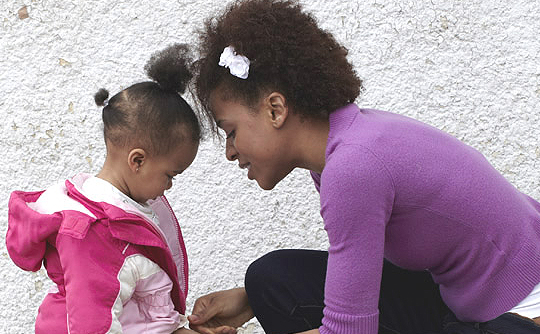
June 13, 2013 | Education, Economic Opportunity
Escaping the Single-Mom Trap
How to solve America's most stubborn poverty problem.

by Amanda L. Freeman
Recent headlines celebrating the fact that women are the main breadwinners in 40 percent of American homes ignored a key statistic: Despite having jobs, many of those women are poor, and most of them—63 percent—are single moms. The median income for single working mothers: just $23,000.
We've known for a long time that education is the best way to lift single moms and their children out of poverty. But obtaining advanced schooling is difficult for women juggling the demands of making a living and mothering their kids.
Fortunately, the Minneapolis-based Jeremiah Program takes a 360-degree, multigenerational approach to helping low-income single moms succeed. And it works: 100 percent of Jeremiah graduates obtain either an Associates or a Bachelor's degree and secure full-time, quality employment by the time they complete the program. As for their children in school, more than 90 percent of them perform at grade level or above.
How to help single moms:
The Jeremiah Program
The Ascend Program at the Aspen Institute
The program was designed in response to interviews with local single mother students. The moms said they did not have reliable, quality childcare or stable, affordable housing, which made consistently attending classes and doing assignments very difficult. Most of the women had few friends and were not part of a supportive community at school, according to Gloria Perez, President and CEO of the Jeremiah Program.
Jeremiah's model is simple: build a campus where low-income single mothers and their kids live in furnished dorm-style apartments while going to school and working in parttime jobs. Their subsidized rent is less than 30 percent of their income, so the average resident pays $135 per month.
A safe, supportive place
The children attend an award-winning early childhood education center on campus, and staff members provide support for the family. "Jeremiah provided a sense of security for us," says Tiffany Meeks, one of the first graduates of the Jeremiah Program in 2000. "It was a safe place for me to live with my daughter where I could actually focus on my school work without struggling day-to-day to figure out how I was going to pay rent and care for her."
Participants also meet with a life skills coach every week to develop strategies to tackle whatever curveballs life throws them. "We make sure they are getting the help they need, whether it's for mental health issues or a doctor appointment for their child," says Perez.
Even more than they depend on the staff, participants learn to rely on each other. "Most of us have social networks that help us cope day in and day out. But the single moms who come to the Jeremiah Program are very isolated, so we are helping them to develop these social networks," says Perez.
Mary Claire Schmitt moved into Jeremiah's St. Paul campus when her son was only six weeks old. "You become so close to the other women. It is like another family," says Schmitt. And the benefits are clear for the kids too. "My son had his friends across the hallway if he was bored or if I needed to go to a meeting or get something done for school, I would just ask them to watch him. We all helped each other."
Today, the Jeremiah Program operates two campuses in St. Paul and Minneapolis, serving 300 women and children each year, and they are expanding with a new site in Austin, Texas.
"I'd probably be working minimum wage at Mall of America."
Key to the program's success is its mandate to help moms and kids move forward together. "A two generation approach makes sense," says Anne Mosle, vice president of the Aspen Institute. "Mothers will not leave their children behind."
The success stories are impressive. Schmitt and her son lived on the Jeremiah campus for a full five years while she worked to get her BA in family consumer nutritional science with a concentration in fashion. Now, she owns a home and works as an assistant manager for a fashion store. Her son is excited to start kindergarten in the fall. "I don't think I would've finished school if it weren't for Jeremiah," says Schmitt. "I would probably be working in a minimum wage job at the Mall of America, living with my parents."
Before coming to Jeremiah, Meeks also worried she wouldn't be able to finish school. She had been evicted from a crowded one-bedroom apartment and even spent a short time homeless before she and her 3-year-old daughter moved onto the Jeremiah campus in Minneapolis. Now Meeks is a marketing coordinator at the University of Minnesota.
This spring her daughter will graduate from high school and head off to college. "She saw me pushing to achieve my goals, and because I did (graduated from college), it was never a question for her. It was just the next step," says Meeks. Through those tough times, her daughter provided the motivation to keep going. "Sometimes I just wanted to say, 'screw this,' and give up, but then I would look at her little face, and I knew what I had to do."
Amanda L. Freeman is a writer, researcher and doctoral candidate specializing in single-mother-headed families.